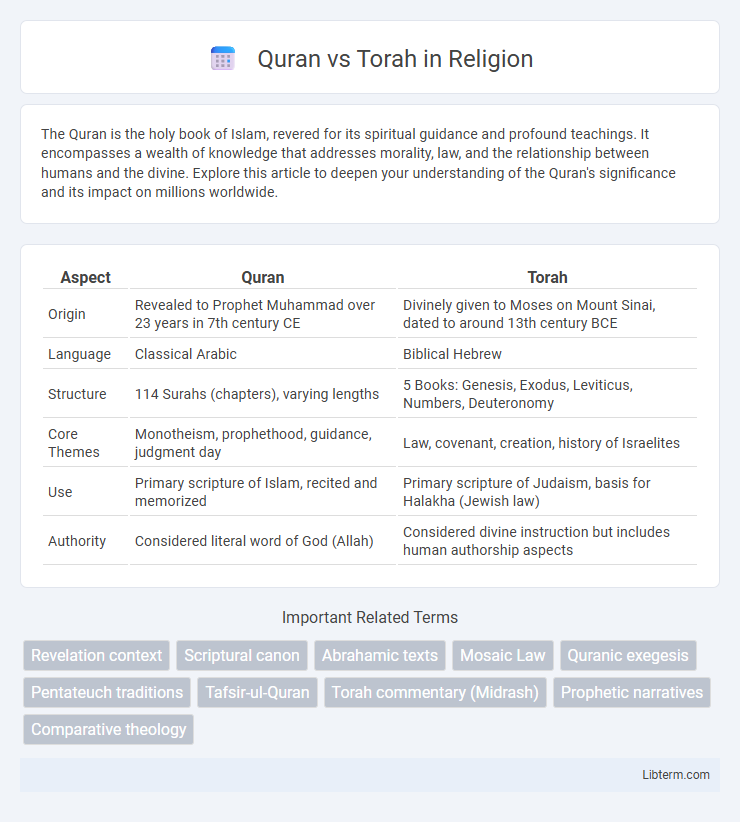The Quran is the holy book of Islam, revered for its spiritual guidance and profound teachings. It encompasses a wealth of knowledge that addresses morality, law, and the relationship between humans and the divine. Explore this article to deepen your understanding of the Quran's significance and its impact on millions worldwide.
Table of Comparison
| Aspect | Quran | Torah |
|---|---|---|
| Origin | Revealed to Prophet Muhammad over 23 years in 7th century CE | Divinely given to Moses on Mount Sinai, dated to around 13th century BCE |
| Language | Classical Arabic | Biblical Hebrew |
| Structure | 114 Surahs (chapters), varying lengths | 5 Books: Genesis, Exodus, Leviticus, Numbers, Deuteronomy |
| Core Themes | Monotheism, prophethood, guidance, judgment day | Law, covenant, creation, history of Israelites |
| Use | Primary scripture of Islam, recited and memorized | Primary scripture of Judaism, basis for Halakha (Jewish law) |
| Authority | Considered literal word of God (Allah) | Considered divine instruction but includes human authorship aspects |
Historical Background of the Quran and Torah
The Quran, believed to be revealed to Prophet Muhammad in the 7th century CE, serves as the central religious text of Islam, reflecting Arabian Peninsula's historical and cultural context during that period. The Torah, comprising the first five books of the Hebrew Bible, is traditionally ascribed to Moses and records the ancient laws, narratives, and covenant between God and the Israelites, dating back to the 13th-5th centuries BCE. Both texts have profoundly influenced the development of monotheistic religions, with the Torah forming the foundation of Judaism and the Quran introducing Islamic theology and legal principles.
Origins and Revelation Context
The Quran, revealed to Prophet Muhammad over 23 years in 7th-century Arabia, is considered the final Islamic scripture, emphasizing monotheism and prophetic continuity. The Torah, traditionally attributed to Moses, comprises the first five books of the Hebrew Bible and forms the foundation of Jewish law and narrative, revealed during the Exodus period. Both texts serve as primary religious and legal sources within their respective faiths, reflecting distinct historical and cultural origins.
Language and Literary Style
The Quran is primarily written in Classical Arabic and is renowned for its unique rhythmic prose and intricate linguistic patterns, often employing rhyme and repetition to enhance memorability and spiritual impact. The Torah, composed mainly in Biblical Hebrew with some portions in Aramaic, features a more straightforward narrative style characterized by legal codes, genealogies, and historical accounts. While the Quran emphasizes poetic and rhetorical elements that evoke auditory richness, the Torah's literary style is marked by concise legal language and storytelling aimed at preserving religious law and history.
Structure and Composition
The Quran is composed of 114 chapters called surahs, each varying in length and organized primarily by descending order of length rather than chronological sequence. The Torah consists of five books--Genesis, Exodus, Leviticus, Numbers, and Deuteronomy--structured sequentially to narrate the history and laws of the Israelites. While the Quran emphasizes thematic unity and rhythmic prose, the Torah combines narrative history with legal codes and genealogies, reflecting different compositional approaches within scripture.
Core Beliefs and Teachings
The Quran emphasizes monotheism, prophethood, and the afterlife, serving as the ultimate revelation from Allah to guide humanity. The Torah centers on the covenant between God and the Israelites, outlining laws, commandments, and ethical teachings. Both texts share themes of divine guidance, moral conduct, and a relationship between God and believers but differ in narrative details and specific religious practices.
Prophets and Messengers in Both Scriptures
The Quran and the Torah both highlight the significance of Prophets and Messengers as divine intermediaries guiding humanity. While the Torah extensively details figures such as Moses (Musa), Aaron (Harun), and Abraham (Ibrahim), the Quran expands on many of these prophets, emphasizing their messages and roles, including Jesus (Isa) and Muhammad as the final messenger. Both scriptures underscore prophets' duties to convey God's commandments, but the Quran offers a broader genealogical and theological context binding these figures within Islamic monotheism.
Laws and Ethical Guidelines
The Quran and the Torah both establish comprehensive legal frameworks and ethical guidelines central to Islam and Judaism, respectively. The Quran emphasizes Sharia law, covering aspects like worship, criminal justice, and social conduct, while the Torah outlines mitzvot (commandments) including moral laws, dietary restrictions, and civil regulations. Both texts prioritize justice, compassion, and community welfare but differ in specific legal rulings and interpretative traditions influencing their religious legal systems.
Depictions of God and Monotheism
The Quran emphasizes the absolute oneness and uniqueness of God, describing Him as merciful, omnipotent, and indivisible, reinforcing strict monotheism throughout its verses. The Torah presents God as the singular creator and lawgiver, highlighting a covenantal relationship with the people of Israel while also emphasizing God's holiness and justice. Both scriptures reject polytheism, but the Quran explicitly denounces any division in God's nature, whereas the Torah integrates God's attributes within a narrative of historical interactions with humanity.
Points of Similarity and Divergence
The Quran and Torah share foundational themes such as monotheism, prophethood, and moral law, emphasizing God's oneness and ethical conduct. Both texts contain narratives about prominent figures like Moses and Abraham, yet the Quran presents these stories with distinct theological interpretations and additional prophetic revelations. Significant divergence lies in the Quran's role as the final, unaltered revelation in Islam, contrasting with the Torah's position as the central scripture of Judaism with varied textual histories and rabbinical interpretations.
Influence on Modern Religions and Societies
The Quran serves as the foundational text of Islam, shaping the religious practices, laws, and cultural values of over 1.8 billion Muslims worldwide, while the Torah is central to Judaism, guiding Jewish law, ethics, and identity for millions. Both scriptures have deeply influenced modern religious thought, social justice movements, and legal systems, with the Quran contributing to Islamic jurisprudence (Sharia) and the Torah underpinning Halakha. Their teachings continue to impact interfaith dialogue, educational curricula, and cultural traditions across diverse societies globally.
Quran Infographic

 libterm.com
libterm.com